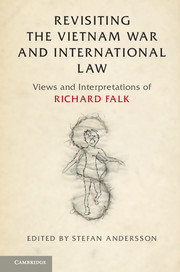
- Publisher:
- Cambridge University Press
- Online publication date:
- December 2017
- Print publication year:
- 2017
- Online ISBN:
- 9781108297011

This collection of scholarly and critical essays about the legal aspects of the Vietnam War explores various crimes committed by the United States against North Vietnam: war of aggression; war crimes in bombing civilian targets such as schools and hospitals, and using napalm, cluster bombs, and Agent Orange; crimes against humanity in moving large parts of the population to so-called strategic hamlets; and alleged genocide and ecocide. International lawyer Richard Falk, who observed these acts personally in North Vietnam in 1968, uses international law to show how they came about. This book brings together essays that he has written on the Vietnam War and on its relationship to international law, American foreign policy, and the global world order. Falk argues that only a stronger adherence to international law can save the world from such future tragedies and create a sustainable world order.
‘The US wars in Indochina were an unspeakable horror. Throughout these terrible years, Richard Falk's voice made a unique contribution to understanding, combining meticulous legal and historical scholarship with acute insight and penetrating analysis, and not least, compassion for the victims and dedication to finding a peaceful and just resolution. The relevance of these essays extends far beyond the Indochina wars, and has only increased over the years as similar quandaries and concerns arise, to the present moment. They merit careful study and serious reflection.'
Noam Chomsky - Institute Professor and Professor of Linguistics Emeritus, Massachusetts Institute of Technology
‘During the Vietnam War, Richard Falk was a prolific writer and commentator on the international law aspects of the conflict. He gave his own analysis and collected and edited the views of others. He covered the background of the Nuremberg trials, the aggression and self-defense dimension of the divided Vietnam, the issue of war crimes, and the US incursion into Cambodia, and he thereby informed a young, curious generation of the legal arguments involved. In the process, Richard Falk introduced the environmental perspective which, in 1977, was to become part of the law of armed conflict. In this volume we have a great collection of his articles and comments.'
Ove Bring - Professor Emeritus of the University of Stockholm and the Swedish Defence University
‘For six decades, Richard Falk has been one of the academy's leading authorities in the fields of both international law and international relations while at the same time standing as one of the world's most notable public intellectuals. This volume not only provides an easily accessible assemblage of some of Professor Falk's most important works on the Vietnam war, but it provides real time insight into the development of international legal thought during the formative years of the Cold War international system. From Falk's discussion of the legal implications of the contrived claims regarding the Gulf of Tonkin incident to the false declarations regarding Iraqi weapons of mass destruction, the reader is struck by the continuing relevance of Professor Falk's analysis and insights to the issues of our day.'
Andrew L. Strauss - Dean and Professor of Law, University of Dayton School of Law
‘Stefan Andersson's edited volume on Richard Falk's seminal writings on the Vietnam War and international law has placed us all under an enormous debt as we hear the drumbeats of a new global triumphalism. Richard Falk's hope that we may learn some crucial lessons from impunity and illegality of the cruelly prolonged Vietnam War is most pressingly relevant now.'
Upendra Baxi - Emeritus Professor of Law, University of Warwick
‘Richard Falk, one of the most prominent living academics in the field of international law, has been an insightful critic of the US war in Vietnam. For those who were caught up the Vietnam War, this book offers a ray of hope that the atrocities of that war will not be forgotten and its lessons will be learned by new generations. If we are to have a future free of war, we must recognize illegality in warfare when it occurs, and new generations must learn to respect international law, particularly the criminal accountability for crimes against peace, war crimes, and crimes against humanity set forth in the Nuremberg Principles and the treaty establishing the International Criminal Court. I hope this book will be widely read throughout the world and certainly by citizens and leaders who have responsibility for decisions to use military force and for the conduct of wars.'
David Krieger - President, Nuclear Age Peace Foundation
 Loading metrics...
Loading metrics...
* Views captured on Cambridge Core between 28th December 2017 - 2nd April 2025. This data will be updated every 24 hours.
Usage data cannot currently be displayed.